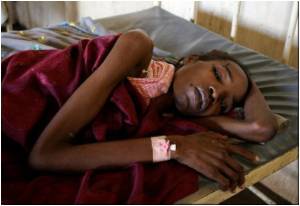The WHO has revealed that UN health experts rushed to northern Haiti to help tackle a sudden outbreak of diarrhoeal disease that has left 150 dead

"Some stool samples were positive for cholera by rapid diagnostic tests," said WHO spokeswoman Fadela Chaib.
"Stool samples were taken to a laboratory in Port-au-Prince for laboratory confirmation. So final confirmation that it is or not cholera is still pending," she added in an e-mail to journalists.
The WHO spokeswoman said Haitian authorities asked for assistance with the outbreak of diarrhoea and vomiting.
"Although we cannot confirm the nature of this illness until the laboratory results are given to us we are concerned at the speed which which it has spread," Chaib told journalists earlier.
Haitian officials said on Thursday that 135 people had died and 1,500 people were taken ill with the disease.
Advertisement
The WHO said Friday that 150 had died, with the same number infected.
Advertisement
The WHO said samples from hospitalized patients were being tested for different diarrheal-disease pathogens, including the cholera bacteria..
Chaib said: "Medical teams have been mobilised including epidemiologists from our office in Washington, medical supplies are being provided to the local hospitals, including 10,000 boxes of rehydration tablets and water purification sachets."
More teams of international health experts in Haiti were also travelling to the area to assist the local authorities, she added.
The epidemic has grown in the past few days but had not reached the major camps for displaced people in and around Port-au-Prince further south.
The city was ravaged by a 7.0 earthquake in January that left 1.2 million people homeless.
But officials in the country fear that an outbreak in densely-populated tent cities that have poor sanitation and meagre medical facilities has the potential of unleashing a public health disaster.
Source-AFP








